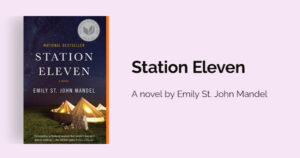
by Emily St. John Mandel, 2014
Found this book in a Little Free Library and it happens to be the Old Town Library’s April 2025 book selection. It was a good book, very well written with really interesting characters, but sort of wandering. It’s about a Traveling Symphony in a world after a flu kills 99.9% of all the people on earth in a matter of weeks. It’s about what happens to the people who are left, some of whom were connected to a really popular actor named Arthur Leander. Arthur dies of a heart attack doing King Lear in Toronto, just hours before the pandemic takes hold. She does a deep-dive into his life – three wives, one son, a good friend, and a little child actress named Kirsten. He gives Kirsten a copy of a comic book his first wife created, called Station Eleven. She carries it with her all through the decades following, as she travels with the Traveling Symphony. The Traveling Symphony walks, they have horses and wagons. It’s all very primitive. The stars are visible again. There are plants and animals everywhere. No one knows anything except their little bit of space and time. Except the Traveling Symphony – they get around a bit more. They run into an evil guy, The Prophet, who thinks the pandemic was God’s judgement and he is the light and he needs to spread it around. He kidnaps his multiple wives, brainwashes his followers, etc. Thankfully, she doesn’t go into a lot of detail regarding his sick mind or his sick actions and he is murdered towards the end. But right before he is murdered, he starts reciting parts of Station Eleven, and Kirsten, who he is about to murder, starts reciting it, too. That saves Kirsten and gives time for the good guys to kill the evil guy. Kirsten thought she had the only copy of Station Eleven, but realizes he had a copy of it, too. It turns out, The Prophet is Arthur Leander’s only son, and Arthur had mailed him a copy of Station Eleven, the only other copy, right before he died.
This book was written 5 years before Covid-19 hit. I wonder what Emily St. John Mandel thought about COVID when it first hit. It sure changed our world but not as drastically as the mutated swine flu in her book.
From Esquire in December 13, 2021: “Who was she, a novelist who’d fictionalized a thoroughly researched but “not particularly scientifically plausible” pandemic, as she describes it, to be viewed as an authority?”…“If it helps, as alarming as this moment is, I remain certain that this isn’t going to end with a traveling Shakespearean theatre company traversing the wasteland of the post-apocalypse,” Mandel offered kindly to one supplicant. The response was textbook Mandel: wry, warm, and unfailingly generous.”…
“It’s a story where civilization collapses, but our humanity persists—maybe there’s something there that people wanted to absorb,” Mandel says. “At the same time, at the beginning of the pandemic, I remember the difficulty of adapting to a life of pure uncertainty. I wanted clues about how this might go, or how it might end. I wanted certainty about the future. Maybe that’s why people reached for Station Eleven, to try to force ourselves to confront what could happen.”…
“What becomes really obvious, if you research pandemics, is that there was always going to be another pandemic,” Mandel says. “It’s just something that happens in our history. There will be something else after Covid-19, and something else after that. It’s like if a novelist had written a novel in the sixties about a fictional war. Does that mean they predicted the Vietnam War? No—there was always going to be another war.”
HBO Max made a 10-part series of Station Eleven. Emily was writing The Glass Hotel, so she didn’t have anything to do with the making of it, but she watched it when it came out – we were 2 years into the COVID pandemic. “But the show moved her deeply, and rang true to the novel’s indefatigable spirit. “It’s weird to say this about a story where almost everybody on earth dies, but it’s rendered with such joy,” Mandel says. “There’s just a lot of love in that story.”…
“That sweetness is all around us. It’s in tea on a terrace, readers grasping for truth in the dark, a writer’s words tattooed on someone’s skin. It’s in Mandel’s urban garden, one of her great pandemic-era sources of beauty and pleasure. Around us bloom the fruits of her labor: over a dozen potted trees, dappled with radiant morning light. “I’m so incredibly grateful for this life,” Mandel muses.
“This life, this world. It’s still here. So are we.”
Beautiful article about Emily St. John Mandel and Station Eleven, written by Mike McGregor for Esquire in December 2021.